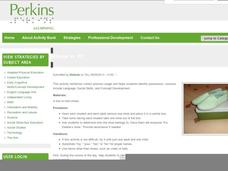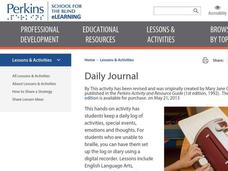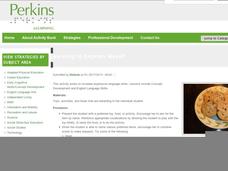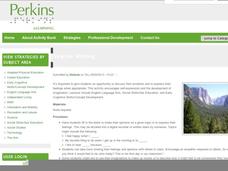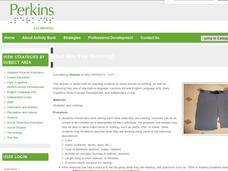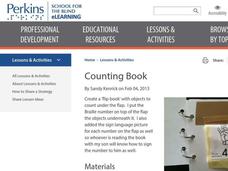Perkins School for the Blind
Personal Information
"Hi, how are you? My name is___." Seems simple enough but it's not always that easy to recall and relate factual information about yourself. Learners with multiple disabilities practice memorizing and relaying personal information about...
Perkins School for the Blind
Circle Time
Oftentimes children or teens with one or more disability are reluctant to participate in whole-group activities. Foster good participation, verbal expression, and social skills through daily circle time activities. Each day you and your...
Perkins School for the Blind
Put the Shoe on Your Foot
Promote clothing identification, body part identification, and dressing skills acquisition with a fun and lively game. Each child takes turns grabbing a clothing item from the central clothing box. As he puts the item on, he sings, "Put...
Perkins School for the Blind
Conversation Skills
It is so important for learners with multiple disabilities to learn how to communicate for both social and functional reasons. Each child will choose a topic from the list and generate five questions related to that topic. They'll split...
Perkins School for the Blind
Hat Game
Sometimes the simplest ideas foster a lot of different skills. To boost social skills, group participation, identifying others by name, and dressing skills, learners play the hat game. They take turns wearing a hat while singing a song...
Perkins School for the Blind
Let's Pretend
Playing pretend with real objects or concepts is a wonderful way for learners to make object-to-action connections, as well as practice daily living skills. Learners with visual and intellectual disabilities use a wide variety of real...
Perkins School for the Blind
Initial Consonant Activity
Bingo is a super fun game and can be used to reinforce a vast number of recognition skills. These bingo cards are prepared by constructing nine squares, each delineated with raised Wikki Stix or gluedyarn and containing a braille...
Perkins School for the Blind
Tactile Journals
I absolutely love this idea. Children with visual impairments create tactile journals which describe an event from the previous week in an artistic way. They verbally describe one event from the previous week and then use a wide array of...
Perkins School for the Blind
Learning to Identify Sounds Made by the Body
Sneeze, snap, tap, and whistle; Did I do that? Explore the parts and sounds of the human body with your learners with visual impairments. First you'll name the parts of the body, make a sound with each part, and then have the class guess...
Perkins School for the Blind
Teach Personal Possession and Pronouns with Simple Objects
The concept of what is mine and what is yours seems simple, but for children with visual impairments, it is a concept that must be taught. Each child in the class puts one of their shoes in a single box, they take turns choosing a shoe,...
Perkins School for the Blind
Daily Journal
Keeping a daily journal is fun. It builds strong writing skills and provides an expressive outlet. For children with visual impairments, it's even more important. It provides a way for them to connect written word with real events, which...
Perkins School for the Blind
Learning to Express Myself
Expressing one's wants and needs is vital for learners of any age or ability level. Young children with visual impairments and intellectual disabilities practice asking for preferred items, foods, or activities in a structured manner....
Perkins School for the Blind
Taking Turns
For small children or learners with disabilities, learning to wait patiently and taking turns is very important. In pairs, two children with visual impairments take turns asking for, waiting for, and playing with a musical toy. Each turn...
Perkins School for the Blind
The Country Egg
Because most children with visual impairments don't reach and grab things at a young age the way sighted children do, they need additional supports to build up their fine motor skills. Here, they work on the pincer grasp, using their...
Perkins School for the Blind
Encouraging Students Who are Blind or Visually Impaired to Express Their Feelings and Explore Imagination
Being expressive in a creative, empathetic, or imaginative way is not only fun, it builds good pre-writing and communication skills. Learners with visual impairments have a roundtable discussion session where several sentence frames are...
Perkins School for the Blind
Learning Names of Articles of Clothing
What to wear today; such a vexing question. Spend some time introducing the names, fabrics, types, colors, and functions of various articles of clothing to your class. Each child will take turns asking each other what they are wearing....
Perkins School for the Blind
Prepositions
When most children learn about prepositions, they are provided with a visual to show them the concepts of on, in, near, and beside. For learners with visual impairments, concepts need to be constructed in a very concrete way. A stuffed...
Perkins School for the Blind
Counting Book
Here is a wonderful way to teach children with visual impairments how to count and build number recognition skills. Included, you will find a set of instructions on how to create a counting book from card stock, jump rings, and cotton...
Perkins School for the Blind
Grocery Shopping
Grab those reusable bags, it's time to go shopping! Intended to foster independent living skills in learners with visual impairments, the instructional activity covers several topics related to grocery shopping. They start by planning a...
Perkins School for the Blind
What Do I Hear?
Being able to give positive reinforcers to a child starts with knowing what the child likes. Intended for children with blindness, this lesson gives you a way to determine the types of music your learners like best. You are given a set...
Perkins School for the Blind
Safety Skills
Learning how to stay safe in a dangerous situation is of utmost importance, especially when you have a visual impairment or special need. The teacher makes up a set of dangerous scenario cards based on the provided set of guiding...
Perkins School for the Blind
Left Versus Right
When you can't see, it is extremely important to be able to reorient yourself. Learners with visual impairments work though an activity to build spacial awareness based on moving left and right. A marker (bracelet, bell, or weight) is...
Perkins School for the Blind
Familiar Sounds
To foster concept development and auditory discrimination skills, learners with visual impairments listen to identify a variety of common sounds. The teacher makes recordings of various sounds, including those found in the home, at the...
Perkins School for the Blind
Memory
When you are blind, your hands become your eyes, so learning how to discriminate between various objects through touch is a very important skill. Make a memory game by gluing common items onto cardstock. The kids feel, identify, and then...











